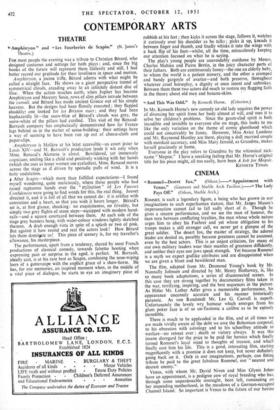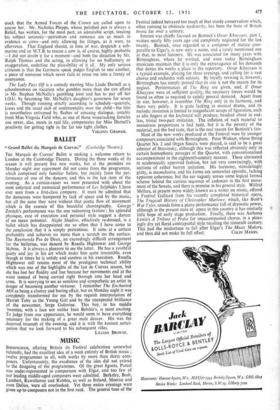CINEMA
" Rommel—Desert Fox." (Odeon.)—" Appointment with Venus." (Gaumont and Marble Arch Pavilion.)—" The Lady Pays Off." (Odeon, Marble Arch.) ROMMEL is such a legendary figure, a being who has grown in our imaginations to such superhuman stature, that Mr. Jaws Mason's impersonation cannot fail to fall sadly short of it. Though he gives a sincere performance, and we see the man of honour, the man torn between conflicting loyalties, the man whose whole nature urges him to obey his Fuehrer and yet whose obligation to his troops makes a still stronger call, we never get a glimpse of the great soldier. The desert fox, the master of strategy, the adored leader are denied us, possibly because greatness cannot be assumed, even by the best actors. This is an unjust criticism, for many of our own military leaders wear their mantles of greatness diffidently, and neither their eyes nor jaws speak strength. Yet because Rommel is a myth we expect godlike attributes and are disappointed when we are given a blunt and bewildered man.
The film, adapted from Mr. Desmond Young's book by Mr. Nunnally Johnson and directed by Mr. Henry Hathaway, is, like so many book adaptations, a series of disconnected scenes. In this case they are strung together by documentary films taken in the war, terrifying, inspiring, and the best sequences in the picture. As Hitler Mr. Luther Adler gives a• memorable performance, his appearance uncannily accurate and his manner historically paranoic. As von Rundstedt Mr. Leo G. Carroll is superb. Unfortunately the lovely wry humour which emerges from his glum poker face is of so un-Teutonic a calibre as to be entirely incredible.
There is much to be applauded in the film, and at all times we are made vividly aware of the debt we owe the Bohemian corporal, to his obsession with astrology and to his schoolboy attitude to warfare—no retreat ever ; death or victory always. It was this insane disregard for the price to be paid for heroics which finally turned Rommel's loyal mind to thoughts of treason, and which finally cost him his life. This is a good, interesting film, starting magnificently with a promise it does not keep, but never definitely going back on it. Onl' in our imaginations, perhaps, can fitting tribute be paid to the great fabulous Rommel, our nearest and dearest enemy."- Venus, with whom Mr. David Niven and Miss Glynis Johns have an appointment, is a pedigree cow of royal breeding who has, through some unpardonable oversight, been left, ruminating on her impending motherhood, in the meadows of a German-occupied Channel Island: So important is Venus to the future of our bovine stock that the Armed Forces of the Crown are called upon to rescue her. Mr. Nicholas Phipps, whose polished pen is always a Relief, has written, for the most part, an admirable script, treating his subject seriously—patriotism and romance are as much in evidence as cows—and only allowing his fringes, as it were, to effervesce. That England should, in time of war, despatch a sub- marine and an M.T.B. to rescue a cow is, of course, highly probable —I did not doubt it for a moment—and both the direction by Mr. Ralph Thomas and the acting, in allowing for no buffoonery or exaggeration, underline the plausibility of it all. My only serious criticism is that the Germans speak pidgin English to one another, a piece of nonsense which never fails to rouse me into a frenzy of annoyance.
The Lady Pays Of is a comedy starring Miss Linda Darnell as a schoolmistress on vacation who gambles more than she can afford in Mr. Stephen McNally's gambling joint and has to pay off her I.O.U. by becoming Mr. McNally's daughter's governess for seven weeks. Though running strictly according to schedule—quarrels, kisses and the usual slab of sentimentality over the child—the film is nevertheless enlivened by flashes of amusing dialogue, notably from Miss Virginia Field who, as one of those wisecracking females one never, alas, meets in real life, compensates for Miss Darnell's proclivity for getting tight in far far too tight clothes.
VIRGINIA GRAHAM.



































 Previous page
Previous page